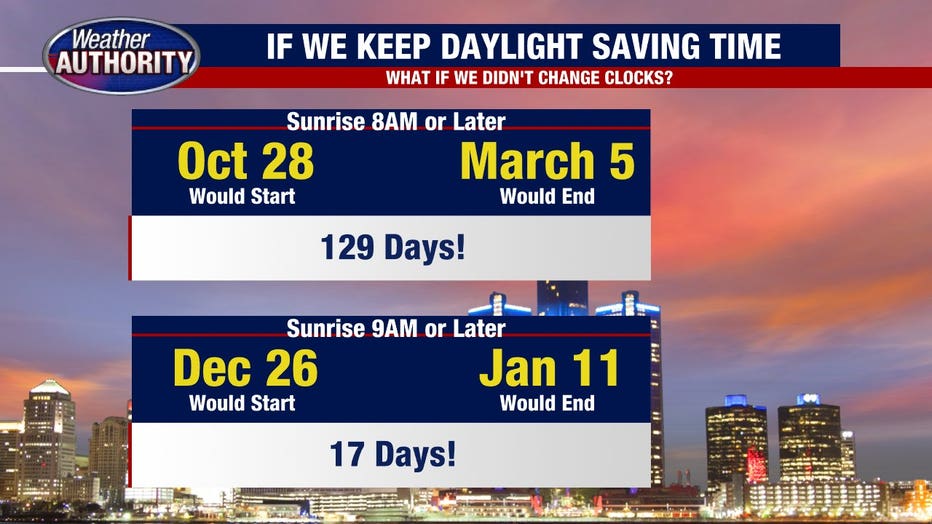Would permanent daylight saving time be good for Detroit and Michigan?
Photographer: Anthony Lanzilote/Bloomberg via Getty Images
DETROIT (FOX 2) - We're more than a week into daylight saving time and the sun lingers longer every day. We add two or three minutes of daylight every single day as the earth's rotation continues what's done since the beginning of time. We now have more than three more hours of daylight compared to Dec. 20, our winter solstice.
The daily gains in daylight will drop a bit as we get closer to the summer solstice on June 21 when we experience the longest day of the year. There will be 15 hours and 14 minutes of daylight on the astronomical start of summer.
On March 13, we again changed our clocks forward to start daylight saving time. The original idea was simple: conserve energy. But now it's become the not-so-welcome right of spring commuters arrive to the office lacking sleep and parents struggle to adjust their kids and bodies as quickly as possible. But 2022's DST change could be one of the last.
Last Tuesday, just three days after daylight saving time, the U.S. Senate unanimously approved making DST permanent.
According to a poll conducted by YouGov, more than half of those surveyed would be in favor of keeping daylight saving time year round - 59% said yes. Meanwhile, 19% said no and 24% were ‘not sure’.
But what does it mean to abolish the longtime practice?
In Michigan, it would mean winter sunrises happening much later in the day - as in after 8 a.m. But it's more than that. Almost half of our fall sunrises would also be after 8.
What would permanent daylight saving look like?
Since daylight saving happens from March to November, a permanent version like that would primarily impact the winter months. For more than four months (Oct. 28-March 5, to be exact), the sun wouldn't be up until after 8 a.m.
For 17 days (Dec. 26-Jan. 11), the sun wouldn't come up until AFTER 9 a.m.
RELATED: How Michigan's sunrises and sunsets would change with daylight saving time
Those on the 9-5 work schedule would find that even the sun would be up when they got back from work, so their entire day at home wouldn't be spent in darkness. But, kids would also be getting on the school bus in the dark for much of the winter.

In fact, a lot of the morning work and driving that Michigan residents do would be done in the dark during winter months. Mornings would also be colder.
Daylight saving becomes a public health hazard
It's not just energy usage that didn't pan out.
Studies show that TV ratings sink, but kids get less exercise, and workplace productivity falls. Traffic accidents and workplace injuries also climb when clocks spring forward in March, as do heart attacks.
RELATED: The best ways to prepare you body for the time jump
And then there's the confusion that a shorter or longer day your body feels when clocks spring forward or jump back.
Why do we have daylight saving?
Before it became a nuisance for people and an association with public health hazards, daylight saving time was implemented in the 1960s as a trick to conserve energy. But it was also a chance to give us more time in the day with the sun up to get things done.
"The real goal of daylight saving time is to move the hours of human activity to make the best use of daylight," said David Prerau, computer scientist and author of "Seize the Daylight".
The change is literally meant as a time for saving daylight, added Prerau, as most human activity occurs during the day.
In terms of the history, there was a need for DST, especially in the 1910s during WWI.
"It was World War I, and the Germans had heard of [daylight saving time]," said Prerau. "The Germans actually adopted daylight saving time first to help save energy during World War I in 1916. Once they did that, the British followed suit almost immediately after having rejected it for many years."
So….is would it be good for Michigan and Detroit overall?
Well, to answer that question, we have to consider if we want sunsets after 6 p.m. every day or if we want sunrises before 8 a.m.

